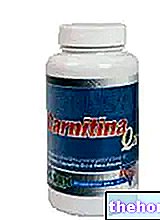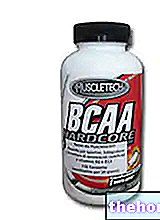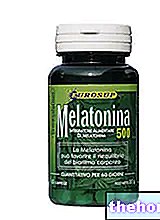
About ZMA - Anderson
ZMA - ANDERSON
Food supplement based on zinc, magnesium and vitamin B6
FORMAT
Pack of 60 capsules
COMPOSITION
Zinc monomethionine
Zinc / Magnesium aspartate
Vitamin B6 - Pyridoxine HCl
Excipient: Magnesium stearate
Capsule: Hard gelatin
Per capsule: Zinc 10 mg - Magnesium 150 mg - Vitamin B6 3mg
Product Features ZMA - Anderson
ZMA - is a product based on zinc and magnesium, enriched with vitamin B6, designed to improve the anabolic drive by increasing the endogenous secretion of anabolic hormones. This supplement features a patented form, which covalently combines zinc / monomethionine with zinc / magnesium aspartate and vitamin B6. The aforesaid forms represent the best absorbable formulations by the human intestine.
Zinc: trace element present in nature mainly in foods of animal origin and in some vegetables, where it is complexed with phytic acid. The most bioavailable form is obviously the one found in the animal kingdom, where zinc is associated with methionine, and for which enterocytic transport appears to be better. The daily requirement is set at 7 mg for women and 10 mg for men; it can therefore be achieved by simply feeding. Consequently, its deficiencies are present exclusively in some risk categories, generally accompanied by diseases of the gastrointestinal tract. The importance of zinc is due to its regulatory role, involved in intracellular singalling and hormone secretion, to its structural role (it is part of the structure of transcription factors and membrane proteins), and to its role as an enzymatic cofactor.
Several studies have shown how the need for zinc can increase following intense physical activity, and how its supplementation can be effective in modulating hormone secretion during physical activity. The molecular mechanism through which zinc exerts remains to be investigated. your action.

Supplementation in sports has shown a potential adjuvant role of anabolism, with a reduction in the decrease of thyroid hormones and testosterone, an increase in erythrocytes and hemoglobin, with a consequent improvement in aerobic capacity, a reduction in lactate production and a better use of glucose. muscle, even to an increase in plasma levels of free testosterone, documented in a recent study dated 30/03/2010.

- It increases blood glucose levels: it promotes glycogenolysis and gluconeogenesis;
- Promotes the synthesis of neurotransmitters such as serotonin, dopamine, norepinephrine and GABA.
- Guides the synthesis of the heme group, necessary for hemoglobin to bind oxygen;
- It allows the synthesis of Niacin, starting from tryptophan;
- Modulates the hormonal action;
Vitamin B6 is used in the treatment of numerous diseases, with particular importance for neurodegenerative, cardiovascular and immune disorders.
Its daily requirement is around 1 / 1.5 mg, but even in this case the cases of deficiency are very rare.
Rationale for use - ZMA - Anderson
Although the literature shows various scientific evidences on the benefit of supplementation with trace elements in sports, the studies (FEW) concerning the application of ZMA seem somewhat disappointing. The only study, among other things not published, in which an increase in testosterone levels was obtained following the administration of ZMA, was subsequently denied by several independent studies, in which, unfortunately, the intake of this supplement did not reported no benefit.
Although the supplement in question focuses on the more bioavailable form of the two trace elements, there is scientific evidence for which the intake of zinc could interfere with the absorption of magnesium, clearly unbalancing the balance between magnesium taken and magnesium eliminated in the urine. .
Method of use recommended by the company - ZMA - Anderson
Swallow one serving (1 capsule) daily, 30-60 minutes before bedtime with water or other liquid of your choice on an empty stomach.
Method of use in sports practice - ZMA - Anderson
Given the failures of supplementation with this supplement in sports, there are no studies that define an optimal dosage, or at least at which benefits can be realized.
With regard to the individual elements, however, it seems that in sports the most effective dosage is that of 10mg / kg / day for magnesium and 3mg / kg / day for zinc. At these doses, however, some side effects are documented, mainly concentrated in the gastrointestinal tract with diarrhea.
ZMA side effects - Anderson
Zinc: high amounts of zinc introduced are responsible for abdominal pain, diarrhea, nausea and vomiting. Chronic zinc administration (60 mg / day total) is associated with copper deficiency.
Magnesium: high amounts of magnesium are responsible for profuse diarrhea. The increase in serum magnesium levels is instead associated with hypotension, confusion, heart rhythm disturbances, deterioration of renal function, fatigue, breathing difficulties, even cardiac arrest. The safe supplementation dose seems to be 350mg / die.
Vitamin B6: chronic administration can be responsible for damage to the nervous system and neuropathies of various levels already at doses above 200mg / day.
ZMA - Anderson interactions
Zinc: in addition to interfering with other trace elements such as copper, it could reduce the absorption of some antibiotics such as tetracyclines, reducing their effectiveness.
Magnesium: may interfere with some antibiotics, tranquilizers and oral anticoagulants, reducing their effectiveness.
Precautions for use ZMA - Anderson
The product is contraindicated in cases of renal or hepatic pathology, cardiovascular disease and / or hypertension, during pregnancy, during lactation and under 14 years.
This article, elaborated on the critical rereading of scientific articles, university texts and common practice, is for information purposes only and therefore has no medical prescription value. It is therefore always required to consult your doctor, nutritionist or pharmacist before undertaking the use of any supplement.. Learn more about ZMA's critical analysis - Anderson.
Serum testosterone and urinary excretion of steroid hormone metabolites after administration of a high-dose zinc supplement.
Koehler K, Parr MK, Geyer H, Mester J, Schänzer W.
Eur J Clin Nutr. 2009 Jan; 63: 65-70. Epub 2007 Sep 19.
Effects of Zinc Magnesium Aspartate (ZMA) Supplementation on Training Adaptations and Markers of Anabolism and Catabolism.
Wilborn CD, Kerksick CM, Campbell BI, Taylor LW, Marcello BM, Rasmussen CJ, Greenwood MC, Almada A, Kreider RB.
J Int Soc Sports Nutr. 2004 Dec 31; 1: 12-20
Effect of fatiguing bicycle exercise on thyroid hormone and testosterone levels in sedentary males supplemented with oral zinc.
Kilic M.
Neuro Endocrinol Lett. 2007 Oct; 28: 681-5.
The effect of exhaustion exercise on thyroid hormones and testosterone levels of elite athletes receiving oral zinc.
Kilic M, Baltaci AK, Gunay M, Gökbel H, Okudan N, Cicioglu I.
Neuro Endocrinol Lett. 2006 Feb-Apr; 27 (1-2): 247-52.
Zinc supplementation in rats subjected to acute swimming exercise: Its effect on testosterone levels and relation with lactate.
Kaya O, Gokdemir K, Kilic M, Baltaci AK.
Neuro Endocrinol Lett. 2006 Feb-Apr; 27 (1-2): 267-70.
Neuroendocrine responses to running in women after zinc and vitamin E supplementation.
Singh A, Papanicolaou DA, Lawrence LL, Howell EA, Chrousos GP, Deuster PA.
Vitamin and mineral status of trained athletes including the effects of supplementation.
Weight LM, Noakes TD, Labadarios D, Graves J, Jacobs P, Berman PA.
Am J Clin Nutr. 1988 Feb; 47: 186-91.
Effects of Magnesium Supplementation on Testosterone Levels of Athletes and Sedentary Subjects at Rest and after Exhaustion.
Cinar V, Polat Y, Baltaci AK, Mogulkoc R.
Biol Trace Elem Res. 2010 Mar 30. [Epub ahead of print]
The effects of magnesium supplementation on thyroid hormones of sedentars and Tae-Kwon-Do sportsperson at resting and exhaustion.
Cinar V.
Neuro Endocrinol Lett. 2007 Oct; 28: 708-12.
Update on the relationship between magnesium and exercise.
Nielsen FH, Lukaski HC.
Magnes Res. 2006 Sep; 19: 180-9. Review.
Magnesium sulfate enhances exercise performance and manipulates dynamic changes in peripheral glucose utilization.
Cheng SM, Yang LL, Chen SH, Hsu MH, Chen IJ, Cheng FC.
Eur J Appl Physiol. 2010 Jan; 108: 363-9. Epub 2009 Oct 9.
Magnesium sulfate enhances exercise performance and manipulates dynamic changes in peripheral glucose utilization.
Cheng SM, Yang LL, Chen SH, Hsu MH, Chen IJ, Cheng FC.
Eur J Appl Physiol. 2010 Jan; 108: 363-9. Epub 2009 Oct 9.
The effect of magnesium supplementation on lactate levels of sportsmen and sedanter.
Cinar V, Nizamlioğlu M, Moğulkoc R.
Acta Physiol Hung. 2006 Jun; 93 (2-3): 137-44.
















.jpg)











